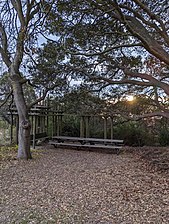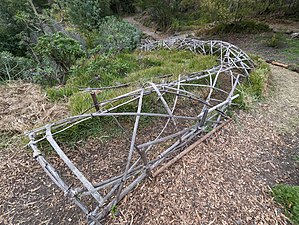Blake Garden (Kensington, California)
| Blake Garden | |
|---|---|
 Formal Garden with reflecting pool and Blake House in Blake Garden | |
| Type | Public |
| Location | 70 Rincon Road Kensington, California, United States |
| Coordinates | 37°54′48″N 122°17′07″W / 37.91346°N 122.28521°W |
| Area | 10.6 acres (4.3 ha) |
| Created | 1957 by |
| Status | Open year round |
| Website | Official Blake Garden website |
Blake Garden is a teaching facility for the
History
Blake family
In Berkeley (before Kensington).
One of the original trustees of the University of California, Anson Gale Stiles, purchased land on Piedmont Avenue, east of the present-day Berkeley campus in the late 1860s.[1] Anson's Piedmont house was completed in 1895.[2] Anson ultimately left the property to his daughter, Harriet Waters Stiles (1840–1928). Additionally, two of Harriet's sons, Anson Stiles Blake (1870–1959) and Edwin Tyler Blake (1875–1949), would later build homes and gardens on this same property.
In Kensington.
When the Stiles/Blake family land on Piedmont was later purchased by the university in 1922 to build Memorial Stadium, the families relocated to a 45-acre (18 ha) site in Kensington, encompassing where Blake Garden is today. The site was owned by Harriet who divided the land evenly between her four children: Eliza; Robert; Edwin; and Anson.
Two of those children - Eliza Seely Blake Thatcher (1872–1944), and Robert Pierpont Blake (1886–1950) - lived outside the Bay Area and sold their shares to developers.[3]: iii
The two other siblings, Anson and Edwin Blake, built two homes on the property in the Kensington hills. Anson Blake's house was completed in 1925, and is also known as La Casa Adelante. Edwin Blake's house is also known as Quinta de La Lilas.[4]
The widowed Harriet would live with Edwin, while Anson's sister-in-law, Mabel Symmes (1875–1962), would live with Anson and Anita (1872–1962), his wife and Mabel's sister.[5] Anita and Mabel transplanted much of the Piedmont garden to the new Kensington site, taking four months and thirty truckloads to do so.[6]
Anson Blake's house is now Blake Garden (see below). Over the next thirty years, the Symmes sisters would continue to collect botanical specimens and develop the site. A small colony of semi-feral cats kept the rodent population from eating the plants.[6] From the start, the Blakes invited students from the Department of Landscape Architecture at the University of California to the estate.[3]: vi
Edwin Blake's house is now a Carmelite Monastery, which is adjacent to Blake Garden.
University of California
The garden was deeded to the University of California in 1957 by Anson and Anita Blake,
The President of the University of California had traditionally lived in
Russell Beatty succeeded Scott as the director of Blake Garden in 1967, implementing a new mission as an "outdoor laboratory" for student projects in landscape architecture.[13] In addition, the Children's Adventure Garden and Playground was built in 1970, spearheaded by Walter Doty, and ran for three years, with children responsible for tending plants under the guidance of Berkeley students.[14] Under Beatty, the Cut-Flower Garden was created in 1973 and a bouquet was delivered daily to the House.[13]
Hitch's successor as UC President,
The
Design
Blake House and Formal Garden
-
Western facade of Blake House, from the Lower Lawn
-
Eastern facade of Blake House
-
Formal Garden and grotto with reflecting pool, east of Blake House
-
Eastern facade and reflecting pool with magnolia trees
Blake House was a 27-room mansion designed in a Spanish style by Walter Danforth Bliss[22] for Anson Blake and his wife Anita.[9] Hitch called it "the biggest three-bedroom house in the world", as the first floor was used for formal receptions and official functions, while residential spaces were limited to the second floor.[23] The 1967–68 remodel as the UC Presidential house left the building with 12,434 sq ft (1,155.2 m2) of floor space, seven bathrooms, two kitchens, and three bedrooms.[3]: vii Blake Garden occupies a site with grades of up to 50%; the land east of Blake House, sited on the upper third, is relatively flat, while the land west of the House is much steeper.[2] The grounds are divided into five "garden rooms": the Formal Garden east of the House; Redwood Canyon to the north of the House; the areas West of the House, including the Lower Lawn and Mediterranean Section; Australian Hollow south of the House, and the Cut-Flower Garden east of Australian Hollow, including a vegetable garden, the Cottage Garden, the Square Garden, greenhouses, and tool sheds used by the Blake Garden staff. In addition, there is an entrance area that connects the House with Rincon Road to the east.[23]
Selected locations in and near Tilden Regional Park
- Points of interest
- Nearby parks and museums
The siting of Blake House is integral to the garden's design: it shelters the Formal Garden from the strong prevailing winds off the Golden Gate.[2][23] The grounds for both estates were designed by Mrs. Blake's sister, Mabel Symmes, who graduated from the university's Landscape Architecture Department in 1914. Ms. Symmes' original plan showed great sensitivity to the site. Much of her original plan can still be seen in the design of the Formal Gardens east of the house, with its grotto, inspired by the Villa Tusculana at Frascati, Italy and the reflecting pool which was part of a system to take advantage of underground water.[4] The koi that live in the pool are named for Blake family members.[23]
The garden is home to nearly 1500 plant species, over fifty bird species, as well as raccoons, frogs, salamanders, and the occasional fox. The garden is all
Outdoor garden rooms in Blake Garden
-
Redwood Canyon and creek
-
Disconnected stone bridge over the Redwood Canyon stream
-
View west to the Golden Gate Bridge
-
Garrett Eckbo pergola in the Mediterranean Garden
-
Blackberry brush tunnel in Australian Hollow
There are two streams on-site, draining the north and south edges; both were stabilized with vegetation during construction.
Plantings on the steep slope west of the house include the Mediterranean Garden, a showcase of drought-tolerant plants from the world's Mediterranean climates in diamond-shaped beds linked by switchback paths leading to a lookout over the Bay on the property's western edge,[6] near a large lawsonite rock outcropping[23] and a picnic shelter reconstructed by Professor Garrett Eckbo.[24]
The original plan also shows a lake in the Australian Hollow, the southwestern corner of the property, taking advantage of the high water table in that part of the garden.
South of Blake House, Anita Blake and Mabel Symmes had planned and built a formal, symmetric Rose Garden surrounding a square pool.
Residents
- 1928–1962: Blake family (Anson Blake, Anita Blake, and Mabel Symmes)
- 1962–1964: Prytanean Alumni Foundation (female graduate students)
- 1969–1975: UC President Charles J. Hitch
- 1975–1983: UC President David S. Saxon
- 1983–1992: none, but hosted official events
- 1992–1995: UC President Jack Peltason
- 1995–2003: UC President Richard C. Atkinson
- 2003–2008: UC President Robert C. Dynes
See also
- List of botanical gardens and arboretums in California
- List of botanical gardens in the United States
References
- ^ Cohn, Abby (November 30, 2001). "UC Berkeley's 'secret garden' / Lush retreat for nature lovers in Kensington". San Francisco Chronicle. Retrieved 26 December 2022.
- ^ a b c d e Haymaker, Linda (Spring 1987). "Blake Garden". Pacific Horticulture. 48 (1): 8–13. Retrieved 26 December 2022.
- ^ a b c d e f Riess, Suzanne B. (1988). Blake Estate Oral History Project. Bancroft Library, University of California.
- ^ a b "Symmes Design". Blake Garden. UC Berkeley, College of Environmental Design Archives. Retrieved 23 December 2022.
- ^ a b "The Blake Estate". Blake Garden. UC Berkeley, College of Environmental Design Archives. Retrieved 23 December 2022.
- ^ a b c d e f g Ray, Meghan (Spring 2019). "Blake Garden History: 1922 to 1970" (PDF). Eden. 22 (2). California Garden & Landscape History Society: 4–11.
- ^ "[Mai Kitazawa] Arbegast". Blake Garden. UC Berkeley, College of Environmental Design Archives. Retrieved 23 December 2022.
- ^ "[Geraldine Knight] Scott". Blake Garden. UC Berkeley, College of Environmental Design Archives. Retrieved 23 December 2022.
- ^ a b c "$459,000 in Private Gifts Spent on UC Chief's Home". Press Democrat. UPI. June 15, 1969. Retrieved 23 December 2022.
- ^ a b "Becoming the President's Residence". Blake Garden. UC Berkeley, College of Environmental Design Archives. Retrieved 23 December 2022.
- ^ "University of California buys $6.5M Berkeley home for its president". Berkeleyside. 12 April 2022. Retrieved 30 June 2022.
- ^ McFadden, Charles (April 27, 1973). "University officials receive big benefits". San Bernardino Sun. Retrieved 23 December 2022.
- ^ a b "[Russell] Beatty". Blake Garden. UC Berkeley, College of Environmental Design Archives. Retrieved 23 December 2022.
- ^ "Children's Adventure Garden". Blake Garden. UC Berkeley, College of Environmental Design Archives. Retrieved 23 December 2022.
- ^ Akers-Sassaman, J.W. (July 20, 1983). "UC President To Buy $500,000 Home". California Aggie. Retrieved 23 December 2022.
- ^ a b Gordon, Larry (October 4, 2010). "UC weighs what to do with abandoned president's mansion". Los Angeles Times. Retrieved 26 December 2022.
- ^ Fainaru, Steve (August 21, 2010). "University Head's Housing Raises Ire". The New York Times. Retrieved 26 December 2022.
- ^ Leff, Lisa (September 17, 2013). "Janet Napolitano May Move Into Restored UC President's Mansion". NBC Bay Area. AP. Retrieved 26 December 2022.
- ^ Dinkelspiel, Frances (April 12, 2022). "University of California buys $6.5M Berkeley home for its president". Berkeleyside. Retrieved 26 December 2022.
- ^ "Architectural gem returns to UC". University of California. 23 December 2021. Retrieved 30 June 2022.
- ^ "Geology and Hydrology". Blake Garden. UC Berkeley, College of Environmental Design Archives. Retrieved 23 December 2022.
- ^ "The History of the Garden". Blake Garden. UC Berkeley College of Environmental Design. Archived from the original on 24 December 2022. Retrieved 23 December 2022.
- ^ a b c d e f g Valentino, Silas (March 12, 2022). "This 100-year-old untapped East Bay gem is turning a new leaf". SF Gate. Retrieved 23 December 2022.
- ^ Sommer, Julia (May 24, 1995). "Blake Abloom". Berkeleyan. Retrieved 23 December 2022.
- ^ Gracyk, Janet (Summer 2020). "The Elusive Mabel Symmes" (PDF). Eden. 23 (3). California Garden & Landscape History Society: 36–47.
Further reading
- Symmes, Mabel (1945). "Adelante". Journal of the California Horticultural Society. VII. California Horticultural Society: 210–216.
- Symmes, Mabel (1945). "Adelante Part II: The terrace and the long pool". Journal of the California Horticultural Society. VII. California Horticultural Society: 314–318.
- Symmes, Mabel (1945). "Adelante: The Square Gardens and the Groves | The South Garden". Journal of the California Horticultural Society. VII. California Horticultural Society: 358–361.
- Symmes, Mabel (1945). "Adelante: The Square Gardens and the Groves | The North Garden". Journal of the California Horticultural Society. VII. California Horticultural Society: 382–386.
- Symmes, Mabel (1946). "Adelante: The Canyon". Journal of the California Horticultural Society. VIII. California Horticultural Society: 23–27.
- Symmes, Mabel (1946). "Adelante: The Canyon (concluded)". Journal of the California Horticultural Society. VIII. California Horticultural Society: 68–72.
External links
- Official Blake Garden website
- Riess, Suzanne B. (1988). Blake Estate Oral History Project. Bancroft Library, University of California. Alternate link at openlibrary.org
- Visiting Eden: The Public Gardens of Northern California, photographs by Melba Levick, text by Joan Chatfield-Taylor. Chronicle Books, 1993, ISBN 0-8118-0107-1













